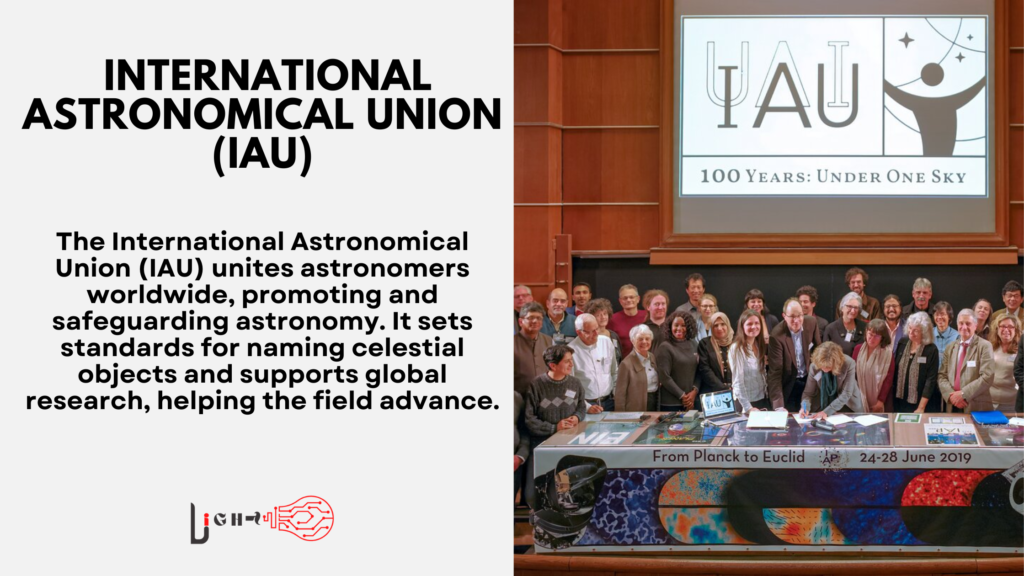The International Astronomical Union (IAU) is a pivotal organization in the realm of astronomy. Established to promote and safeguard the science of astronomy, it plays a key role in unifying the global community of astronomers. By setting standards for astronomical nomenclature and supporting research efforts worldwide, the IAU ensures that the discipline continues to thrive and evolve.
What is the International Astronomical Union ?
The IAU is an international organization dedicated to advancing the field of astronomy. Founded in 1919, it aims to promote collaboration among astronomers and establish common standards for the astronomical community. The IAU oversees the naming of celestial objects and manages various scientific programs aimed at expanding our understanding of the universe.
The organization serves as a bridge between professional astronomers, amateur stargazers, and educators. Its membership includes over 12,000 astronomers from more than 100 countries, making it a truly global institution. Through its various initiatives, the IAU fosters the exchange of knowledge and the development of new techniques in astronomical research.
A Brief History of the IAU
The IAU was established in 1919 in Brussels with the goal of uniting astronomers across different nations. It came into being shortly after World War I, with a mission to rebuild international scientific collaborations.
Since then, the organization has played a central role in major astronomical developments. The IAU’s history is marked by significant milestones, such as redefining planetary status and coordinating global efforts to map the night sky. Over the decades, the union has continued to evolve, adapting to the rapid advancements in space technology and astronomy.

Key Achievements of the International Astronomical Union
Planetary Naming and Classification
The IAU is responsible for the official naming of planets, moons, and other celestial bodies. This process ensures that names are consistent across languages and cultures, following a set of guidelines designed to avoid duplication. The organization’s efforts help maintain an orderly catalog of space objects, allowing for accurate scientific communication.
The naming conventions also involve the use of mythological references or significant cultural figures, which adds a historical dimension to astronomy. The IAU’s work in this area is essential for organizing the vast amount of data collected from space observations.
Defining the Status of Pluto
One of the most debated decisions made by the IAU was the reclassification of Pluto as a dwarf planet in 2006. This decision followed years of discussion about what constitutes a planet. The IAU defined a planet based on three criteria: orbiting the Sun, having sufficient mass to be nearly spherical, and clearing its orbit of other debris.
Pluto failed the third criterion, leading to its reclassification. While the decision sparked controversy, it exemplified the IAU’s commitment to refining astronomical definitions based on new knowledge.
How to Become a Member of the IAU
Membership in the IAU is open to professional astronomers with a PhD or equivalent in astronomy or related fields. Candidates are nominated by existing members or national astronomical societies. The IAU also has provisions for young astronomers to join, providing opportunities to engage with the global scientific community.1
Members can participate in commissions, attend IAU events, and contribute to policy decisions. Being part of the IAU offers a platform for collaboration and professional growth within the field of astronomy.
The Role of the IAU in Modern Astronomy
Today, the IAU remains at the forefront of astronomical research and policy-making. It collaborates with space agencies, observatories, and research institutions worldwide to coordinate large-scale projects, such as tracking near-Earth objects and exploring exoplanets.
The organization also influences public understanding of space by developing educational programs and advocating for the preservation of dark skies. Its ongoing efforts ensure that astronomy continues to be a dynamic and evolving field.
From Sunrise to Seasons: How Rotation and Revolution Shape Our World
To know more click here:https://light.vintbit.com/general-knowledge/rotation-and-revolution-earth/
Frequently Asked Questions about the IAU
What does the IAU do?
The IAU promotes astronomy by setting standards for celestial naming, supporting research initiatives, and fostering international collaboration.
How can one join the IAU?
Membership is open to professional astronomers, with nominations made by peers or astronomical societies.
Why did the IAU reclassify Pluto?
Pluto was reclassified because it did not meet all the criteria set by the IAU for a planet, particularly the requirement to clear its orbit.
Additionally, the IAU has played a crucial role in defining astronomical concepts, such as the criteria for planetary classification. The organization’s influence extends beyond research, contributing to educational initiatives and outreach programs that make astronomy more accessible to the public

